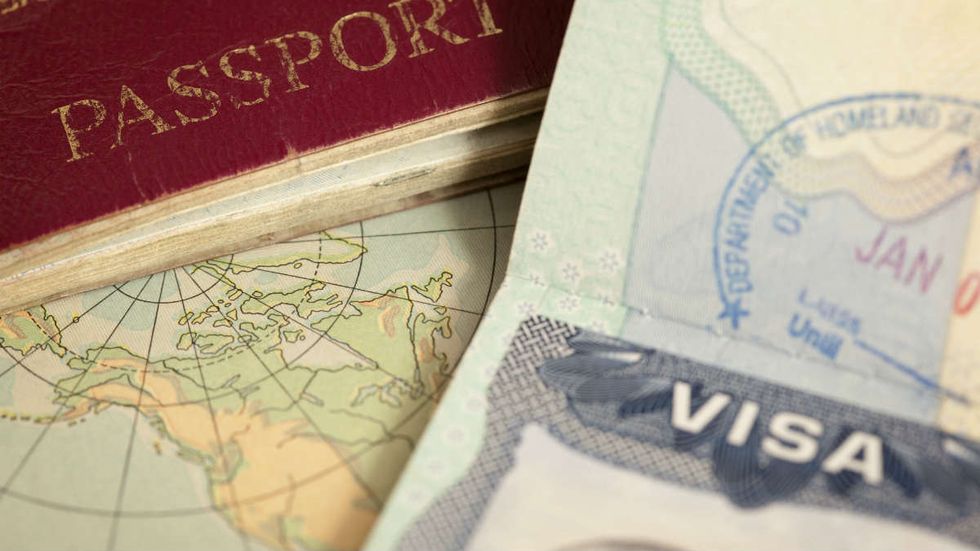
© 2024 Blaze Media LLC. All rights reserved.
Horowitz: Trump’s updated immigration moratorium list: A good start
February 03, 2020
In what is perhaps more important news to the future of our nation than impeachment, the White House announced late on Friday an updated “travel ban,” with a new list of countries from which immigration has been suspended due to national security concerns.
Pursuant to a new DHS global assessment report of how carefully countries share identity-management and national security information with us, the administration has determined a need to suspend immigration visas to nationals of Burma (Myanmar), Eritrea, Kyrgyzstan, Nigeria, Sudan, and Tanzania. The acting DHS secretary has also determined a need to continue the suspension of visas from the countries on the existing list – Iran, Libya, Somalia, Syria, North Korea, Venezuela, and Yemen.
According to the White House, the determination was based on three criteria: “Whether a foreign government engages in reliable identity-management practices and shares relevant information; whether a foreign government shares national security and public-safety information; and whether a country otherwise poses a national security or public-safety risk.”
The new proclamation indicates that the DHS report recommended “implementing suspensions and limitations on entry for certain nationals of twelve additional countries,” more than the six that were ultimately restricted. It appears that senior administration officials felt that some of the other countries either made improvements to their data sharing in recent months or were left off the list because the U.S. “has experienced a recent deepening of diplomatic ties that generally mark increased cooperation toward achieving key regional and global United States foreign policy goals.”
The new ban is slated to take effect on February 22.
This is a good start for Trump to finally fulfill his campaign promise of ratcheting down immigration from dangerous parts of the world. However, there are some glaring omissions and inconsistencies in the proposal:
1) The ban on these six countries is only for immigrant visas. Nationals of these countries are still eligible for all non-immigrant visas, including student visas. We have about 13,400 foreign students from Nigeria. In the case of Sudan and Tanzania, the only form of immigrant visa that is suspended is the diversity visa lottery. Sudan is embroiled in an Islamic civil war. And according to the White House, all these countries have “deficiencies in sharing terrorist, criminal, or identity information,” thereby creating “an unacceptable likelihood that information reflecting the fact that a visa applicant is a threat to national security or public safety may not be available at the time the visa or entry is approved.” If that is the case, then why is the ban so limited?
2) Nationals of these countries can still apply for waivers. As we’ve already seen from the existing countries on the list, 48 percent of all applications for visas from those countries were approved, totaling 42,000 issuances over the past two years.
3) Nobody in government can say with a straight face that the Chinese share any meaningful information with us. Border agents have told me this firsthand about processing Chinese nationals at the border. China poses the greatest espionage, counter-intelligence, and trade secret theft threats of any country. And immigration is its biggest weapon. The director of national intelligence warned in the latest Worldwide Threat Assessment, “China’s intelligence services will exploit the openness of American society, especially academia and the scientific community, using a variety of means,” Yet we bring in more immigrants (roughly 80,000) and long-term foreign students (roughly 370,000) from China than from any other country.
4) The 800-pound gorilla in the room, based on Trump’s campaign promises, is left off the list. Those are the countries from which there is the strongest element of jihadism and a sharia supremacist mindset among the population. Does anyone really believe we can vet the hearts and minds of those from Iraq and Afghanistan? Just over the weekend, an Iraqi immigrant was arrested in Arizona because of an outstanding warrant in Iraq, where he is accused of murdering policemen on behalf of al Qaeda. Yet our government is putting our “diplomatic relations” there ahead of homeland security concerns.
More fundamentally, as I noted regarding our government’s response to the Pensacola shooting and Saudi military trainees, what ever happened to Trump’s promise of ideological vetting? Sure, we have great relations with countries like Saudi Arabia and Egypt, but what about the people living there? They might not have a criminal record, but many of them could harbor jihadist sympathies, as we saw with the Pensacola shooter, Mohammed Alshamrani.
This paragraph from the proclamation should disturb Trump supporters:
In his report, the Acting Secretary of Homeland Security recognized a close cooperative relationship between the United States and the democratically elected government of Iraq, the strong United States diplomatic presence in Iraq, the significant presence of United States forces in Iraq, and Iraq’s commitment to combating the Islamic State of Iraq and Syria (ISIS). The Acting Secretary of Homeland Security considered another similarly situated country and determined that, for reasons similar to those present in Iraq, entry restrictions and limitations would not be appropriate.
Really? This is a pro-Iran government. This is the most vivid illustration of the backward priorities of our national security leaders – send our military to referee Islamic civil wars and then use that as a pretense for bringing in more immigrants to our homeland.
It’s clear the administration is trying to sidestep the issue of ideological vetting, as well as avoid the suspension from countries where the number of immigrants has been significant. In 2018, we only had 838 from Kyrgyzstan and 2,428 from Eritrea. We bring in more from Tanzania (3,186) and Sudan (3,658), but only diversity visas were suspended from those countries. The only countries on the list with significant numbers are Burma (8,182) and Nigeria (13,952). Most of the Burmese are refugees. We’ve admitted a huge number of Burmese refugees in recent years, roughly 170,000 since 2007.
However, if you look at some of the countries with the most jihadists, we continue to bring in tremendous numbers: Iraq (14,351), Afghanistan (12,935), Bangladesh (15,717), Pakistan (15,426), and Egypt (9,668) to name just a few countries. And while we get very few immigrants from Saudi Arabia, we continue to bring in roughly 40,000 foreign students from there, and now will evidently continue the military training program as well.
Very tellingly, when explaining the rationale for the suspension from Kyrgyzstan, the White House notes the presence of “an elevated risk, relative to other countries in the world, of terrorist travel to the United States.” But doesn’t that apply to several dozen other countries not mentioned? Why pick the one with less than 1,000 annual immigrants?
Clearly, the lawyers and bureaucrats in the administration wanted to avoid making this about vetting out jihadist sympathies and more about technocratic criteria of information-sharing. They also wanted to keep the numbers of those affected to a minimum. However, it doesn’t really speak to the prevalent threats that mass migration from many other countries poses. Given the sweeping victory in the Supreme Court on the president’s power to exclude, the administration could have been more aggressive in its approach.
If this is just the first step, then it’s a good one. But if this will set a precedent of foreclosing any ideological vetting, it won’t effectively keep out most terrorists, spies, or security threats.
Want to leave a tip?
We answer to you. Help keep our content free of advertisers and big tech censorship by leaving a tip today.
Want to join the conversation?
Already a subscriber?
Blaze Podcast Host
Daniel Horowitz is the host of “Conservative Review with Daniel Horowitz” and a senior editor for Blaze News.
RMConservative
more stories
Sign up for the Blaze newsletter
By signing up, you agree to our Privacy Policy and Terms of Use, and agree to receive content that may sometimes include advertisements. You may opt out at any time.
© 2024 Blaze Media LLC. All rights reserved.
Get the stories that matter most delivered directly to your inbox.
By signing up, you agree to our Privacy Policy and Terms of Use, and agree to receive content that may sometimes include advertisements. You may opt out at any time.



